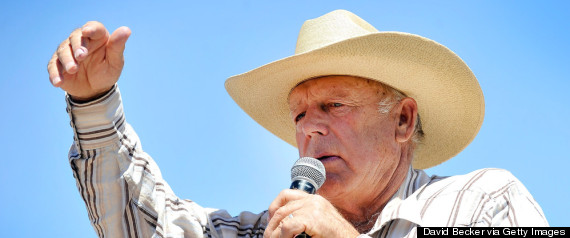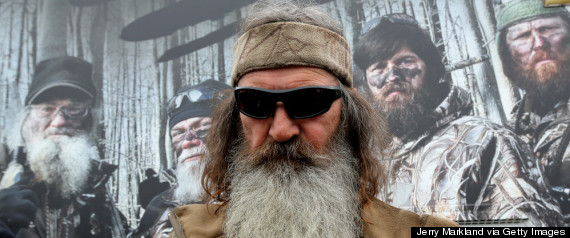If The Supreme Court Says Racism Is Pretty Much Over, Why Are So Many People Still Being So Racist?
Posted: Updated:
Print ArticleThe U.S. Supreme Court ruled 5-4 in June that a key provision of the 1965 Voting Rights Act designed to prevent racial discrimination in certain voting laws was no longer necessary. The majority opinion, authored by Chief Justice John Roberts and joined by Justices Antonin Scalia, Anthony Kennedy, Clarence Thomas and Samuel Alito, stated that “things have changed dramatically” in the South and that the "country has changed" since the Voting Rights Act was passed. The court argued the law had successfully defended against discrimination, but was no longer needed. Racism, the court majority appeared to suggest, was over, and laws created during a time when such hatred was in its heyday served now to place unjust "burdens" on certain states and jurisdictions that wished to pass new voting laws -- laws, of course, that had nothing to do with trying to suppress minority votes.
Last week, the Supreme Court sided with Michigan's ban on affirmative action, passed by voters in 2006, saying it was the state's prerogative to decide how it wanted to handle race-conscious admissions policies. Justice Sonia Sotomayordisagreed with her colleagues' view that "examining the racial impact of legislation only perpetuates racial discrimination," and criticized what she characterized as their decision to "sit back and wish away, rather than confront, the racial inequality that exists in our society."
Referring to a 2007 opinion authored by Roberts, in which he declared that the "way to stop discrimination on the basis of race is to stop discriminating on the basis of race," Sotomayor wrote that the "way to stop discrimination on the basis of race is to speak openly and candidly on the subject of race, and to apply the Constitution with eyes open to the unfortunate effects of centuries of racial discrimination.”
For some Supreme Court justices, the history of racism that guided this discrimination is a thing of the past. But for anyone who's been paying attention in the past year alone, you know that's just plain wrong. Here are some people who prove that not only has racism not been eradicated in the South, it still exists in the upper echelons of power -- even in the judiciary.
Federal Judge Edith Jones

A coalition of attorneys and civil rights groups filed a complaint of judicial misconduct in June against Judge Edith Jones of Houston, of the Fifth Circuit U.S. Court of Appeals, after she made what were alleged to be racist remarks about blacks and Hispanics during a University of Pennsylvania law school speech in February 2013.
According to the complaint, Jones said "racial groups like African-Americans and Hispanics are predisposed to crime," and are more "prone to commit acts of violence" and "heinous" crimes than people of other ethnicities.
Although federal judges are rarely sanctioned for this type of misconduct, the ethics complaint against Jones was transferred from Supreme Court Chief Justice John Roberts to the Judicial Council of the Court of Appeals for the District of Columbia Circuit in June. The appeals court hasn't disclosed whether it has reached a decision.
Other Judges, Too
In the last year, Arkansas Circuit Judge Mike Maggio and former U.S. District Judge Richard Cebull also have come under fire for making derogatory statements about minority groups.
Maggio posted derogatory comments against women, blacks and gays on Louisiana State University fan board Tiger Droppings under the pseudonym “Geauxjudge” for years before Arkansas political blog Blue Hog Report outed Maggio in March.
Cebull was found to have sent hundreds of offensive emails against blacks, Indians, Hispanics and women, the Judicial Council of the 9th U.S. Circuit Court of Appeals said in January.
Donald Sterling

The billionaire owner of the Los Angeles Clippers provided a look into the complex and twisted mind of a racist when a taped conversation between him and his girlfriend -- who is black and Mexican -- was released last week. In the recording, Sterling, who has a well-documented history of racism, berated Stiviano for bringing black people to Clippers games and posing with them in photos posted to social media. “You can sleep with [black people]. You can bring them in, you can do whatever you want. The little I ask you is not to promote it on that … and not to bring them to my games,” Sterling said.
In 2013, more than 70 percent of NBA players, including much of the Clippers' roster, were black. The Clippers responded to the recording by saying that Sterling's comments are "not consistent with, nor does it reflect his views, beliefs or feelings. It is the antithesis of who he is, what he believes and how he has lived his life."
Cliven Bundy

Earlier this month, a national debate about government overreach and individual rights took a not-so-shocking twist, when it turned out that the rancher behind the anti-government movement was a huge racist. After a standoff between armed federal agents and Bundy's supporters -- including militia members -- the rancher gave an interview in which he suggested that the "Negro people" may have been better off as slaves than on "government subsidies." Republicans who had backed Bundy quickly jumped ship.
Bundy, who the federal government says owes more than $1 million in fees for grazing his cattle on federal land, said he wasn't a racist, but only made his situation worse. “If I say 'Negro' or 'black boy' or 'slave,' if those people cannot take those kind of words and not be [offended], then Martin Luther King hasn't got his job done yet," he said. "We need to get over this prejudice stuff."
Steve King

A month after the Supreme Court ruled that “current conditions” do not necessitate voting safeguards against racial discrimination, Rep. Steve King (R-Iowa) claimed that undocumented youths are drug mules with “calves the size of cantaloupes.”
"For everyone who's a valedictorian, there's another 100 out there who weigh 130 pounds -- and they've got calves the size of cantaloupes because they're hauling 75 pounds of marijuana across the desert," King told Newsmax in July.
Despite condemnation from his Republican colleagues and immigration groups alike, the Iowa lawmaker doubled down in an interview with the Iowa Daily Reporter in February.
"I'm not going to apologize," King said. "What I've said is objectively true, and any time that Republicans have criticized me, it's not because of what I said, it's because they disagree with my agenda."
"For everyone who's a valedictorian, there's another 100 out there who weigh 130 pounds -- and they've got calves the size of cantaloupes because they're hauling 75 pounds of marijuana across the desert," King told Newsmax in July.
Despite condemnation from his Republican colleagues and immigration groups alike, the Iowa lawmaker doubled down in an interview with the Iowa Daily Reporter in February.
"I'm not going to apologize," King said. "What I've said is objectively true, and any time that Republicans have criticized me, it's not because of what I said, it's because they disagree with my agenda."
Paula Deen

In June 2013, news broke that Southern chef Paula Deen had a checkered past when it came to her interactions with African-Americans. In a deposition for a lawsuit brought against her by a white former employee, Deen admitted to using the N-word, as well as making racist and anti-Semitic jokes.
While Deen apologized repeatedly, saying that her previous comments were not an accurate representation of her beliefs, the damage was done. A number of companies severed ties, dealing a serious blow to Deen's once-thriving empire. Deen has since announced plans for a comeback.
Pat Garofalo
Minnesota state Rep. Pat Garofalo (R) came under fire in March for a tweetassociating NBA players, three-fourths of whom are black, with criminal behavior.
"Let's be honest, 70% of teams in NBA could fold tomorrow + nobody would notice a difference w/ possible exception of increase in streetcrime,” Garofalo tweeted in March.
After initially defending his statement, Garofalo apologized, insisting he didn’t “have a racist bone in my body.”
“I pride myself on the fact I've tutored in inner-city Minneapolis," Garofalo said in March. “I apologize. I'm responsible for my actions."
Minnesota state Rep. Pat Garofalo (R) came under fire in March for a tweetassociating NBA players, three-fourths of whom are black, with criminal behavior.
"Let's be honest, 70% of teams in NBA could fold tomorrow + nobody would notice a difference w/ possible exception of increase in streetcrime,” Garofalo tweeted in March.
After initially defending his statement, Garofalo apologized, insisting he didn’t “have a racist bone in my body.”
“I pride myself on the fact I've tutored in inner-city Minneapolis," Garofalo said in March. “I apologize. I'm responsible for my actions."
Phil Robertson

While "Duck Dynasty" patriarch Phil Robertson first made waves with hiscomments about the lesbian, gay, bisexual, transgender community, shortly thereafter he created further controversy when he suggested African-Americans were just fine before the civil rights movement.
"They’re singing and happy. I never heard one of them, one black person, say, ‘I tell you what: These doggone white people’ -- not a word! ... Pre-entitlement, pre-welfare, you say: Were they happy? They were godly; they were happy; no one was singing the blues.”
Robertson followed up with a statement claiming that he would "would never treat anyone with disrespect just because they are different from me."
Ted Nugent
In January, the rocker and conservative icon called President Barack Obama a “subhuman mongrel” who deserved punishment for "treason." While Nugent has repeatedly made controversial comments on race and black Americans, he also has insisted he's not a racist. Nugent later apologized for using the terminology, though not to Obama himself.
Despite Nugent's status as an inflammatory entertainer with no real political power, he once held enough political standing to have been invited to the State of the Union address in 2013.
Pax Dickinson

Former Business Insider chief technology officer Pax Dickinson, who served as a leading executives behind a website reaching 23 million unique visitors a month, was forced to resign in September after years of offensive tweets against blacks, women, minimum-wage workers, rape victims and Jews.
“In 'The Passion Of The Christ 2,' Jesus gets raped by a pack of n------. It's his own fault for dressing like a whore though,” the self-professed "brogrammer" wrote in an uncensored tweet in July 2010.
Another tweet in 2012 said, “This election will be decided by single women. It's an epic battle between ‘Jungle Fever’ and ‘Daddy Issues.’"
Dickson also repeatedly targeted women in the tech industry, tweeting, “Tech managers spend as much time worrying about how to hire talented female developers as they do worrying about how to hire a unicorn.”
In a September statement announcing Dickinson’s departure, Business Insider CEO Henry Blodget said Dickinson’s Twitter comments “do not reflect our values and have no place at our company.”
Don Yelton
“In 'The Passion Of The Christ 2,' Jesus gets raped by a pack of n------. It's his own fault for dressing like a whore though,” the self-professed "brogrammer" wrote in an uncensored tweet in July 2010.
Another tweet in 2012 said, “This election will be decided by single women. It's an epic battle between ‘Jungle Fever’ and ‘Daddy Issues.’"
Dickson also repeatedly targeted women in the tech industry, tweeting, “Tech managers spend as much time worrying about how to hire talented female developers as they do worrying about how to hire a unicorn.”
In a September statement announcing Dickinson’s departure, Business Insider CEO Henry Blodget said Dickinson’s Twitter comments “do not reflect our values and have no place at our company.”
Don Yelton
Last fall, "The Daily Show" tracked down a North Carolina Republican precinct captain to weigh in on the state's voter ID laws. During his defense of the laws, which he insisted weren't racist, Don Yelton used both the phrase "lazy blacks" and the N-word, all while claiming one of his best friends is black. He quickly lost the support of the GOP and stepped down. During an exit interview, however, he dropped a few more N-words while making it clear that he had no idea what racism actually is.
“When a n***** can use the word n***** and it not be considered racist, that’s the utmost racism in the world, and it’s hypocrisy,” Yelton said.
Scott Walker’s Aides
The Wisconsin Court of Appeals in February released more than 27,000 pages of emails and documents as part of a now-concluded "John Doe" investigation into Walker’s tenure as Milwaukee County executive.
The documents revealed a 2010 email correspondence between two employees of Walker, then the county executive, exchanging a racist, homophobic, anti-Semitic chain message.
“In the nightmare ... I am a homosexual, and on top of that with a Mexican boyfriend,” the chain email read, “Oh, my God ... Black, Jewish, disabled, gay with a Mexican boyfriend, drug addict, and HIV-positive!!! ... Say it isn't so!!!”
In December, another Walker staffer, then-deputy finance director Taylor Palmisano, was criticized for posting racist tweets about Hispanics in 2011.
"I will choke that illegal mex cleaning in the library. Stop banging (expletive) chairs around and turn off your Walkman," one of the tweets said.
The Wisconsin Court of Appeals in February released more than 27,000 pages of emails and documents as part of a now-concluded "John Doe" investigation into Walker’s tenure as Milwaukee County executive.
The documents revealed a 2010 email correspondence between two employees of Walker, then the county executive, exchanging a racist, homophobic, anti-Semitic chain message.
“In the nightmare ... I am a homosexual, and on top of that with a Mexican boyfriend,” the chain email read, “Oh, my God ... Black, Jewish, disabled, gay with a Mexican boyfriend, drug addict, and HIV-positive!!! ... Say it isn't so!!!”
In December, another Walker staffer, then-deputy finance director Taylor Palmisano, was criticized for posting racist tweets about Hispanics in 2011.
"I will choke that illegal mex cleaning in the library. Stop banging (expletive) chairs around and turn off your Walkman," one of the tweets said.
No comments:
Post a Comment